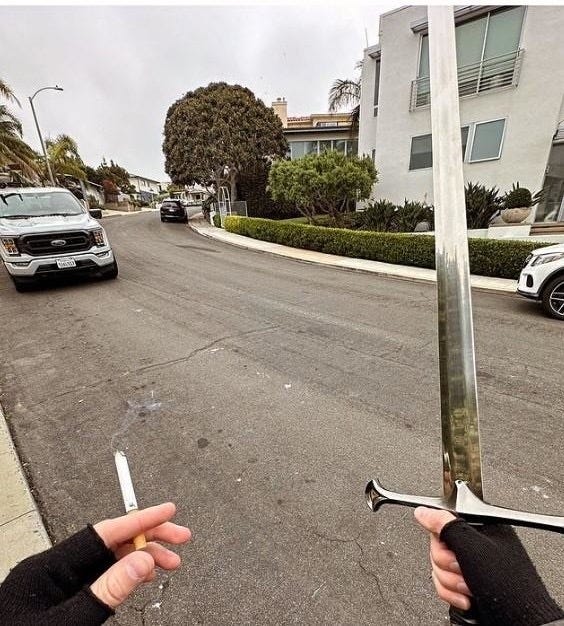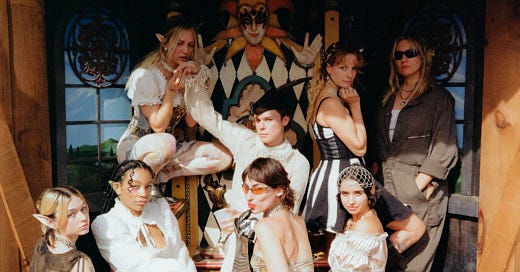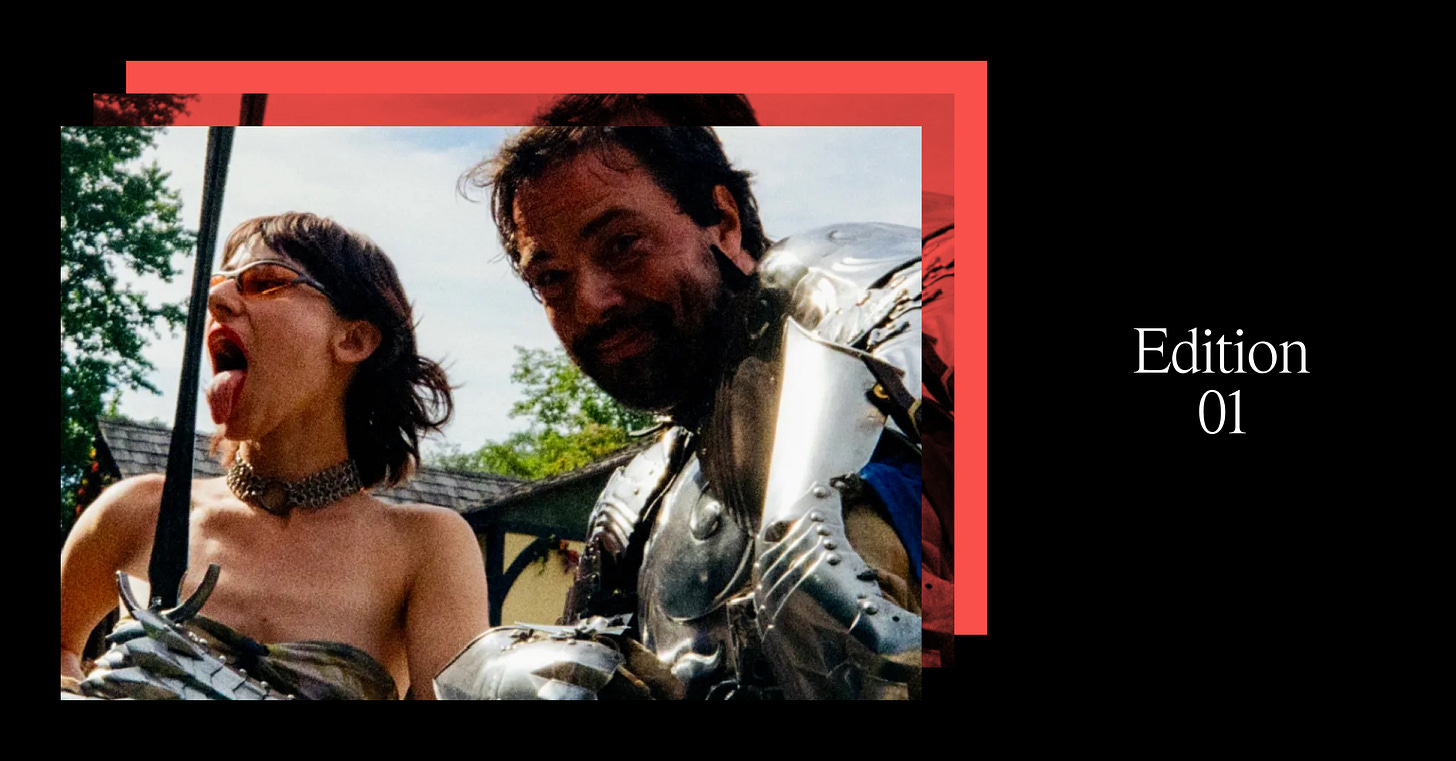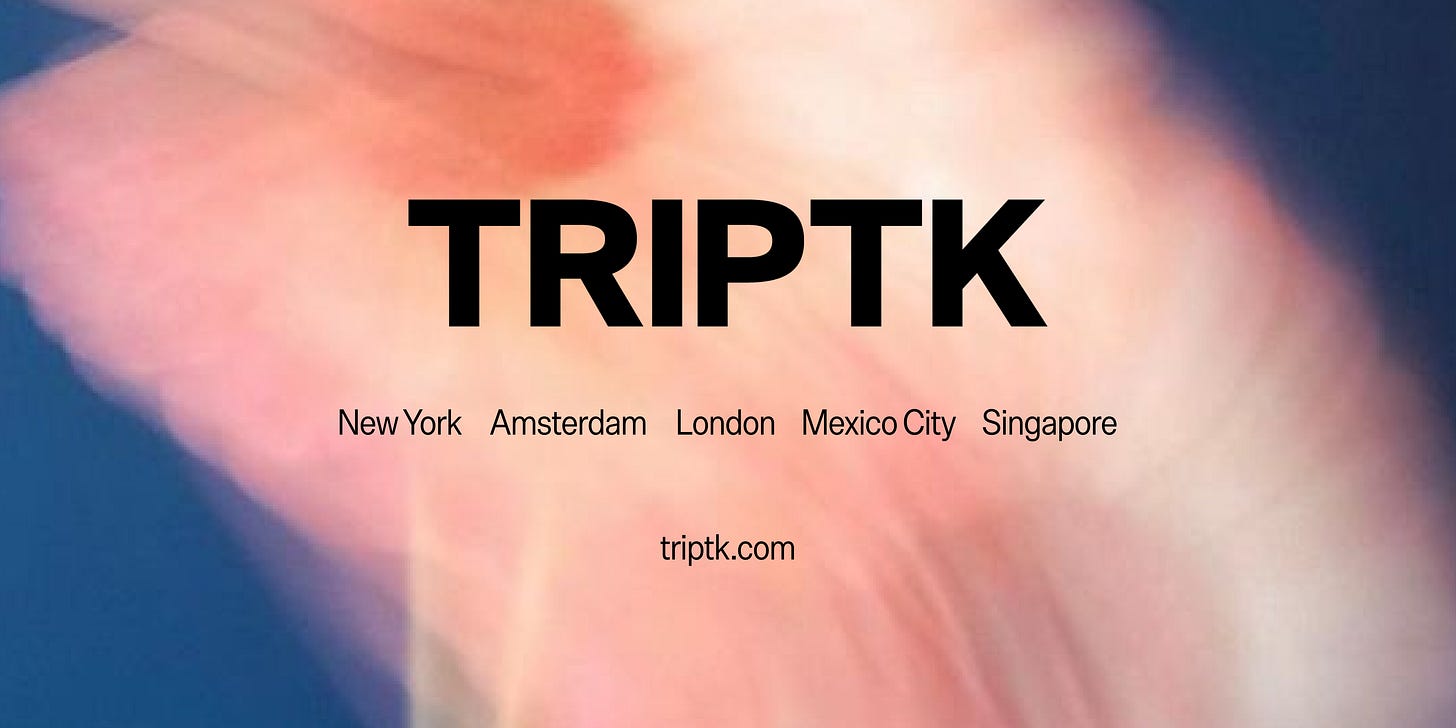Decoding the Ren Faire Renaissance: Why Escapism Needs a Bit of Drama
Chain-mail bikinis, kilted barbarians, fried cheesecake & a Tolkienian legacy
Each issue of Codex, written by a different member of the TRIPTK team, digs into the ephemera, artifacts, case studies, and conversations most interesting to them at the moment.
It’s for readers who want to give more to culture: to contribute vs. appropriate, embed vs. watch from afar, lead vs. follow. Follow along for the ride.


Decoding the Renaissance Faire, a worthy rite of passage
I grew up in Magnolia, a small town outside of Houston, Texas—home to the largest Renaissance Festival in the nation. Obscene traffic every fall, chain-mail bikinis & kilted barbarians at the grocery store, and enthusiastic anime cosplay everywhere; it was a blast and cathartic and eventually (since I grew up seeing it every year) it became a bit irritating.
It was a place for pleasure, for fried cheesecake, for hard drugs & hooking up in the woods (or so I heard), for throwing speedball tomatoes at “jailed” miscreants, for aesthetic experimentation, and for sharing a fantasy. Very reminiscent of its original intent in the early 1960s: “A kind of early, wimpled Woodstock” that paved the way for events like Burning Man and Coachella.
It’s comforting to see how Ren Faires have evolved to become welcoming, inclusive spaces for those willing to buy into the fantasy. Fantasy stories have always been a space where everyone can belong, even if the far right disagrees.
“For anyone itching to get away from the stresses of modern-day life, Ren Faires are a worthy annual rite of passage—but especially for shes, theys, and gays who crave gentle community spaces where we can look hot in elf ears.” Reality Sucks. That’s Why I Love the Renaissance Faire. (Vice, 2023)
A place to escape capitalism (if you’re lucky), to explore identity, to idealize an existence without technology, or to stop thinking about the rising costs of living. Perhaps this is just me — but “you’re going to go home dirty” is an appealing idea.
Recoding the glory of escapism & why it matters
The allure of the Renaissance festival feels familiar. It’s an outsized amalgamation of cosplay and fandom cultures combining with historical poetry, broadswords, and Game of Thrones lore. As Margaret Cho says, “there's this creepy connection between leather sex, Star Trek, and the Renaissance Fair.” Each community uses similar levers to create environments that feel novel and safe, yet uninhibited.


There’s been a cultural interest in all things medieval and Renaissance-themed lately. From Roan of Arc and Natalie Portman’s chain mail, to the drama of the Succession-adjacent Ren Faire on HBO, to my own dinner club (hi, hello), to the indomitable Elizabeth Goodspeed’s longform essay on the emergence of Future Medieval as a trend in graphic design, to Teenage Engineering’s new release (the EP–1320 medieval), to #Rhaenicent or the Rings of Power and its controversial additions—there’s a pull towards experiences that feel more rich, decadent, formal, and perhaps most importantly: dramatic. Medieval theology is even influencing AI & ethics, apparently.
It’s a more carnal & elaborate version of imagination than Disney might have pursued, but it’s a form of magic nonetheless. Cultural novelty feels like a memory, subcultures feel as if they’re collapsing, typical online conversations are monotonous and full of misinformation (not to mention it’s an election year), and the economy comes up more in conversation than the dreams you left behind. Sometimes, a magical escape is all we have.
Disney is too mainstream, too sterile, too family-friendly, too scripted, too expensive. We want dirt in our fingernails, obscure references to Lost Texts™️ (and maps at the beginning of books!), and a return to hope.
“In material philosophy, the act of escaping into our imagination is at best a temporary retreat from reality into fantasy. But in the idealist view, the same act of imagination can reshape our reality. Is it possible that we might bring back from our escapist adventures a renewed sense of our own power and creative potential as human beings?” The great escape. (Aeon, 2013)
The Ren Faire was, and is, that haven, where you not only can adopt a new personality and look but also new circumstances—a new reality. It’s Tolkien at his best: A blend of creative potential, escapism, community, and scripted entertainment that brands might learn from.
As the man himself once wrote: “Escape is one of the main functions of fairy-stories, and since I do not disapprove of them, it is plain that I do not accept the tone of scorn or pity with which ‘Escape’ is now so often used. Why should a man be scorned if, finding himself in prison, he tries to get out and go home?”
Worthy recommendations from Alex Anderson
Each issue, we share a series of recommendations from our team—both cultural artifacts (podcasts, books, essays, movies, playlists, etc.) and philosophical pursuits (questions, processes, advice, etc.).
Podcast? Armchair Expert & Always Sunny
I’ve slowly become a fan of Armchair Expert, as I think we deserve to have unfiltered and genuine conversations with each other. Surprising how much Dax Shepard grows on you over time. I also love TED productions (like Good Sport with Jody Avirgan) and the now-defunct Always Sunny podcast, which recapped the show’s creative decisions before they shelved it due to the hosts being cowards who didn’t want to see it through (also because Rob McElhenney needed more free time to become Ryan Reynolds 2.0).
Advice? Ditch the group brainstorm
Get rid of collective brainstorming. I’m a brainstorm-hater. Always solo time, then group time. Arrive with hypotheses or ideas crystallized, so you can make the most of time together. I don’t really believe in group brainstorming unless it’s a big, in-person moment where everyone is locked in and our full attention is on the task at hand.
Question? “Is your ambition helping you?”
Coming from someone with strong opinions and convictions, I often have a hard time letting things go. At its best, ambition creates momentum. But at its worst, ambition creates momentum in the wrong direction. Might be worth letting it go in favor of something else.
Links shared this month in Slack / over text / in decks
Who’s to blame when AI goes awry? Medieval theology can help decide (FastCo): “AI systems fall in an uncomfortable middle ground between moral agents and nonmoral tools.”
TikTok Shop's pushy ad strategy, explained (Vox): “The apps are increasingly just a place to stumble upon things to buy.”
Why the collapse of the Generative AI bubble may be imminent (Substack): “Companies that are currently valued at billions of dollars may fold, or [be] stripped for parts.”
Why We’re Banning Phones at Our School (The Atlantic): “Unfettered phone usage makes [kids] less connected, less attentive, less resilient, and less happy.”
Why does nothing feel real anymore? (DAZED): “The horrific genocidal images that flood our screens, juxtaposed with thirst traps and shitposts.”
CES gets a rebrand (and a new logo) as organizers of the tech show step forward (Laptop Mag): “The old logo—which dates back more than 40 years—was omnipresent for decades at the convention and in all materials online, on badges, on signage, on everything. [Now] unveiled on its website is a new logo for itself.”
TRIPTK worked with the Consumer Technology Association to define a new brand idea & visual identity for both the legacy company and its flagship trade show. This work couldn't have been done without the talented CTA team, whose visionary partnership is leading the organization confidently into the future.
Be sure to reach out if you'll be at CES for 2025, where the rebrand will go into full effect. Magic will be made.
About TRIPTK & Codex
TRIPTK is a brand & innovation consultancy. We partner with leaders to decode and recode critical cultural shifts, creating brand value for today and tomorrow.
Codex is a monthly newsletter sharing the TRIPTK perspective. It’s for readers who want to give more to culture: to contribute vs. appropriate, embed vs. watch from afar, lead vs. follow.
Subscribe to never miss an issue. Opt out (below) at any time.
Any outsized opinions expressed here are solely the authors and do not represent the opinion of the company. If you like this newsletter, consider subscribing or sharing with others who might enjoy it. Feel free to comment, email, say hey, and/or send us things to read.










